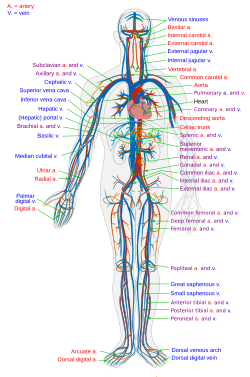**1. Circulatory System Components:**
– The circulatory system comprises the heart, blood vessels, and blood.
– The cardiovascular system includes the heart and blood vessels.
– Blood consists of plasma, red blood cells, white blood cells, and platelets.
– Human circulatory system has two circuits: pulmonary and systemic.
– The lymphatic system complements the circulatory system.
**2. Heart and Circulation:**
– The heart pumps blood to supply oxygen and nutrients to every cell.
– The heart has four chambers: left atrium, left ventricle, right atrium, right ventricle.
– Pulmonary circulation involves oxygen-depleted blood being pumped to the lungs for gas exchange.
– Systemic circulation delivers oxygenated blood from the left heart to the body.
– Coronary circulation supplies blood to the heart muscle.
**3. Blood Vessels and Circulation Pathways:**
– Arteries, veins, and capillaries are part of the circulatory system.
– Aorta is the main artery in systemic circulation.
– Portal veins carry blood from capillaries around the gastrointestinal tract to the liver.
– Cerebral circulation supplies blood to the brain.
– Renal circulation supplies blood to the kidneys.
**4. Health Issues and Medical Specialties:**
– Cardiovascular diseases affect the heart and blood vessels.
– Hematologic diseases like anemia impact the blood.
– Lymphatic diseases affect the lymphatic system.
– Cardiologists specialize in heart health.
– Vascular surgeons focus on blood vessel issues.
**5. Historical and Modern Contributions:**
– Early writings on the circulatory system date back to the 16th century BCE.
– Avicenna and Ibn al-Nafis made significant contributions to understanding circulation.
– William Harvey’s discoveries in the 17th century revolutionized the understanding of blood circulation.
– Nobel Prize winners in Medicine made modern contributions to circulatory system knowledge.
– Various medical terms and concepts related to the circulatory system.
The circulatory system is a system of organs that includes the heart, blood vessels, and blood which is circulated throughout the entire body of a human or other vertebrate. It includes the cardiovascular system, or vascular system, that consists of the heart and blood vessels (from Greek kardia meaning heart, and from Latin vascula meaning vessels). The circulatory system has two divisions, a systemic circulation or circuit, and a pulmonary circulation or circuit. Some sources use the terms cardiovascular system and vascular system interchangeably with circulatory system.
| Circulatory system | |
|---|---|
 The human circulatory system (simplified). Red indicates oxygenated blood carried in arteries. Blue indicates deoxygenated blood carried in veins. Capillaries join the arteries and veins. | |
| Identifiers | |
| MeSH | D002319 |
| TA98 | A12.0.00.000 |
| TA2 | 3891 |
| FMA | 7161 |
| Anatomical terminology | |
The network of blood vessels are the great vessels of the heart including large elastic arteries, and large veins; other arteries, smaller arterioles, capillaries that join with venules (small veins), and other veins. The circulatory system is closed in vertebrates, which means that the blood never leaves the network of blood vessels. Some invertebrates such as arthropods have an open circulatory system. Diploblasts such as sponges, and comb jellies lack a circulatory system.
Blood is a fluid consisting of plasma, red blood cells, white blood cells, and platelets; it is circulated around the body carrying oxygen and nutrients to the tissues and collecting and disposing of waste materials. Circulated nutrients include proteins and minerals and other components include hemoglobin, hormones, and gases such as oxygen and carbon dioxide. These substances provide nourishment, help the immune system to fight diseases, and help maintain homeostasis by stabilizing temperature and natural pH.
In vertebrates, the lymphatic system is complementary to the circulatory system. The lymphatic system carries excess plasma (filtered from the circulatory system capillaries as interstitial fluid between cells) away from the body tissues via accessory routes that return excess fluid back to blood circulation as lymph. The lymphatic system is a subsystem that is essential for the functioning of the blood circulatory system; without it the blood would become depleted of fluid.
The lymphatic system also works with the immune system. The circulation of lymph takes much longer than that of blood and, unlike the closed (blood) circulatory system, the lymphatic system is an open system. Some sources describe it as a secondary circulatory system.
The circulatory system can be affected by many cardiovascular diseases. Cardiologists are medical professionals which specialise in the heart, and cardiothoracic surgeons specialise in operating on the heart and its surrounding areas. Vascular surgeons focus on disorders of the blood vessels, and lymphatic vessels.
